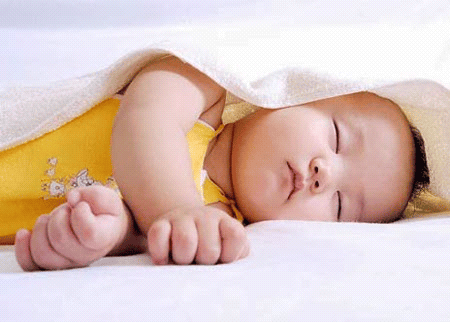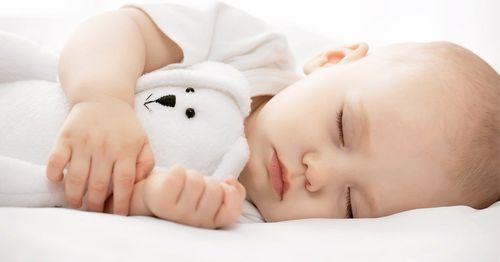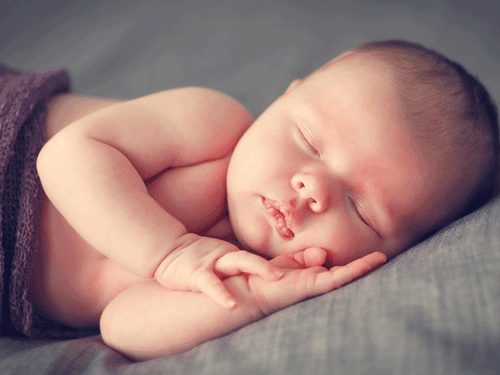This is an automatically translated article.
Article written by Doctor Dam Thi Quynh - Pediatric Center - Vinmec Times City International Hospital
Moro reflex (startle reflex): The reflex usually occurs when a child is startled by loud sounds or strong movements. In response to the sound, the baby may stretch his arms and legs away from himself, cry, but soon he will pull his arms back as if he were hugging him. Sometimes the baby's own cry also startles the baby and initiates this reflex. This reflex lasts until the baby is 5-6 months old.
1. When the startle reflex occurs, the baby will go through two stages
Stage 1: Your baby will experience a sensation of free fall, so her first reaction will be to lift and stretch her arms, maybe even gasp and start fussing. Stage 2: The baby will roll his arms and legs close to the body to return to the same position as the fetus. In fact, there is no way to prevent the startle reflex from occurring. If an infant is startled during the first few months of life, you can be assured that the baby is completely healthy, this reflex usually only lasts for a few short seconds but can also cause a lot of trouble because it can wake the baby. from a good night's sleep and crying. Some babies are able to go back to sleep soon after, but some can't, causing parents to wake up with the baby.
2. So what causes children to startle when they sleep?
There are two groups of causes: benign and pathological.
Benign cause: It is a physiological reflex due to unfamiliarity with the environment, noise or being placed down suddenly, ... usually only happens for a few seconds and then disappears immediately. It is a physiological condition that parents should not worry too much about. Pathological causes include: Children are sick (cough, fever, flu, ...), gastroesophageal reflux syndrome, calcium deficiency, central nervous system damage, congenital heart disease, ... These are the reasons why children do not sleep well and are easily startled. Parents need to follow up to see how long the condition lasts and if it is abnormal, they need to see a specialist for advice.

Tình trạng sốt cao có thể gây giật mình khi ngủ ở trẻ
3. How to make children startle less and sleep better?
Noise is the main cause, mainly startling and panicking children. Therefore, parents need to let their children sleep in a quiet environment, isolated from radio speakers, televisions, etc. A cool air environment, avoiding drafts, and quiet helps children sleep better and deeper. This is the ideal environment to help children limit startling at night.
Feed the baby before going to bed: When hungry, the baby may wake up startled. Therefore, mothers should feed their babies before going to sleep. Breast milk is a great source of nutrition to help children develop comprehensively and have a good night's sleep every day. Keep your baby close to the mother: Many children startle out of fear. Therefore, in the first months of life, the mother should keep the baby next to her mother. Before the child goes to sleep by himself, the mother should hold the child for a while, when the child is fast asleep, the mother slowly puts the child down on the bed. Note that it is not recommended to make a habit of resting the mother's head when sleeping for the child, creating a bad habit for the child. When the baby is fast asleep, the mother should put the baby down slowly on the bed. This way both makes the child not startled, and does not depend on the mother. Encourage children to move: Gentle movements such as stretching and stretching muscles of the legs and arms increase flexibility to help children easily control their reflexes and limit startling. Support the baby's movement by lying on his stomach and raising his head on his own or letting him lie on his lap and control his head and neck.
Keeping the light in the room very soft is also a method to help children reduce startling. Do not suddenly turn on and off bright light while the child is sleeping. The lights should not be turned off completely because the mother will not be able to monitor and detect abnormalities if there are any in the baby during sleep. But the light should not be too bright. A light and soft night light will help your baby feel more secure, and at the same time make it easier for the mother to change diapers and take care of the baby at night.
Avoid other “startling” factors as much as possible. In addition to the main factors that make the baby startle when sleeping mentioned above, there are a number of other factors that mothers need to pay attention to. For example:
Do not play with your child before sleeping to avoid stimulating the baby's nerves. Always make sure your baby's diaper is changed on time, clean, soft, well absorbent to cherish sleep. Your baby's clothes should be soft, comfortable, and maximum comfort.

Quần áo mềm mại giúp bé dễ chịu khi ngủ
Newborns may be startled often when calcium deficiency or have diseases such as gastroesophageal reflux syndrome, central nervous system damage, congenital heart disease,... In these cases, the father Parents should take the child to see a specialist to find out the cause and support with parents in determining the diagnosis and treatment for the child.
In some special cases, when the mother has done everything but the baby is still startled often, accompanied by unusual signs such as: Excessive crying, sweating, poor feeding, .. Mother needs to take her baby to see a specialist.
After treatment, children need to be supplemented with necessary micronutrients such as: Zinc, Selenium, Chromium, Vitamins B1 and B6, ginger, acerola fruit extract (vitamin C), ... to help the immune system good. more, increase resistance and less sickness.
Parents, please regularly monitor website: Vinmec.com to update useful child care information.














